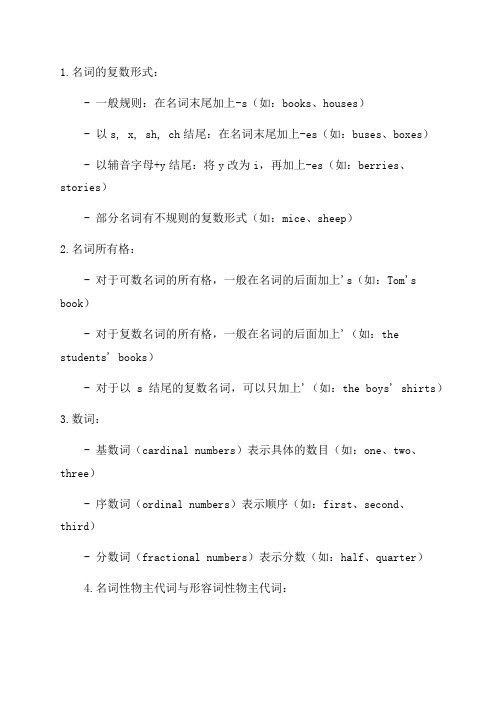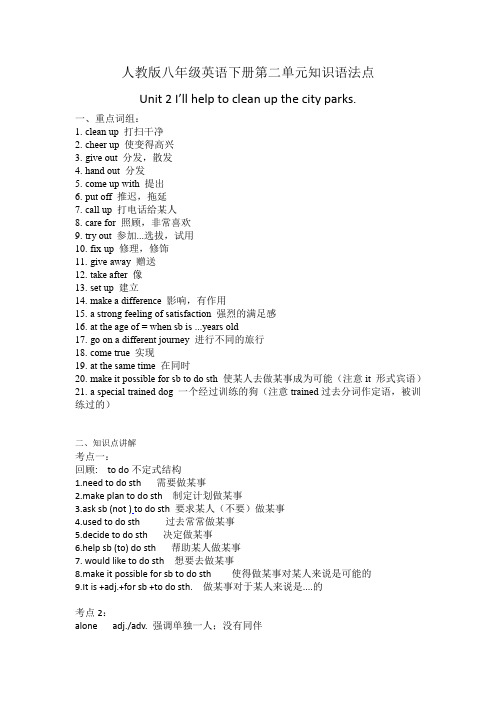(完整版)八年级英语下册第二单元知识点
完整版)人教版八年级英语下册第二单元知识点归纳总结

完整版)人教版八年级英语下册第二单元知识点归纳总结Unit 2: I'll Help Clean Up the City ParksIn our community。
we have many beautiful parks that we can enjoy。
However。
sometimes people leave trash and litter behind。
which can make the parks look messy and uninviting。
That's why I'm excited to help clean up the city parks with my friends。
We plan to set up a le and make a plan to clean up different parks each week。
We'll gather our XXX each other up as we work to make a difference in our community。
We'll also give out flyers and talk to people in the community to encourage them to help keep the parks clean。
We believe that if we all work together。
we can make it possible for everyone to enjoy the parks in a clean and safe environment。
I used to think that one person couldn't make a difference。
but I've XXX caring for our community。
八年级下册英语第二单元知识点

八年级下册英语第二单元知识点八年级下册英语第二单元知识点详解1. 词汇•champion: 冠军•talented: 有才能的•athlete: 运动员•coach: 教练•challenge: 挑战•competition: 竞赛•teamwork: 团队合作•strategy: 战略•skill: 技巧•determination: 决心•inspire: 激励2. 语法直接引语和间接引语直接引语是将别人的话原封不动地引述出来,使用双引号括起来。
例如:He said, “I like playing basketball.”间接引语是将别人的话转述出来,使用陈述句的语序。
例如:He said that he liked playing basketball.状语从句状语从句是用来修饰主句中的动词、形容词或副词的从句。
常见的状语从句有时间状语从句、地点状语从句、原因状语从句、结果状语从句等。
例如:He is studying hard so that he can pass the exam.动词的时态和语态八年级下册英语第二单元主要涉及以下时态和语态:•一般现在时•现在进行时•一般过去时•现在完成时3. 阅读理解八年级下册英语第二单元的阅读理解主要包括根据短文内容回答问题、判断正误、填空等题型。
在解答这些题目时,可以根据短文中的关键词理解和推断答案。
4. 写作技巧八年级下册英语第二单元的写作部分要求学生写一篇有关发表英语演讲的稿件。
在写作过程中,可以按照以下步骤进行:1.确定演讲主题,如“My Favorite Sport”。
2.分段写作,首先介绍自己对运动的喜爱,然后介绍自己喜欢的运动项目以及参加该项目的原因和经历。
3.使用恰当的词汇和句型,如使用形容词来描述运动项目,使用时间状语从句来表达参加该项目的时间等。
4.结尾部分可以总结自己对运动的看法或展望未来。
5. 学习技巧八年级下册英语第二单元的学习技巧部分主要包括听力技巧和阅读技巧。
最全面人教版八年级下册英语第二单元知识点归纳总结

Unit 2 I'll help to clean up the city parks.一、词汇与短语◆重点单词A部分1.cheer v. 欢呼;喝彩2.satisfaction n. 满足;满意3.volunteer v.义务做;自愿做n. 志愿者4.joy n. 高兴;愉快5.sign n. 标志;信号6.owner n. 物主;主人7.notice n.通知;通告;v.注意;意识到8.journey n.(尤指长途)旅行;行程9.lonely adj. 孤独的;寂寞的10.raise v. 募集;征集11.several pron. 几个;数个;一些12.midnight n. 午夜;子夜13.strong adj. 强烈的;强壮的14.alone adv. 独自;单独15.feeling n. 感觉;感触B部分1.repair v. 修理;修补2.door n. 门3.fix v. 修理;安装4.carry v. 拿;提;扛5.broken adj. 破损的;残缺的6.train v. 训练;培训7.wheel n. 车轮;轮子8.excited adj. 激动的;兴奋的9.letter n. 信;函10.training n. 训练;培训11.Miss n. 女士;小姐12.kindness n. 仁慈;善良13.disabled adj. 丧失能力的;有残疾的14.clever adj. 聪明的;聪颖的15.blind adj. 瞎的;失明的16.understand v. 理解;领会17.deaf adj. 聋的18.change v.&n. 变化;改变19.imagine v. 想象;设想20.interest n.兴趣;v. 使感兴趣;使关注21.difficulty n. 困难;难题22.sir n. 先生23.open v. 开;打开24.madam n. 夫人;女士◆重点短语A部分1.clean up 打扫(或清除)干净2.the look of joy 快乐的表情3.cheer up (使)变得更高兴;振奋起来4.at the age of 在……岁时5.give out 分发;散发6.make a plan 制订计划7.come up with 想出;提出(主意;计划等)8.make some notices 制作一些公告牌9.put off 推迟10.work for 为……工作;为……效力11.hand out 分发12.put up 建造;举起;张贴13.call up 打电话给(某人);征召14.for example 比如;例如15.used to 曾经……;过去……16.raise money 筹钱;募捐17.care for 照顾;非常喜欢18.at least 至少19.try out 参加……选拔;试用20.come true 实现21.Clean-Up Day 清洁日22.at the same time 同时23.an old people's home 养老院24.be worried about 担心25.help out with sth. 帮助解决困难26.in one's free time在某人的业余时间B部分1.fix up 修理;装饰2.think about 考虑;思考3.give away 赠送;捐赠4.give sb. orders 给某人下命令5.take after (外貌或行为)像6.the idea of doing sth. 做某事的想法7.set up 建起;设立8.because of 因为;由于9.make a difference 影响;有作用10.at once 立刻;马上11.be similar to 与……相似12.do the volunteer job 做志愿者工作13.be able to 能够14.work out fine 圆满解决15.be excited about (doing) sth. 对(做)某事感到兴奋◆重点句子A部分1.The boy could give out food at the food bank. 这个男孩可以在食品救济站分发食物。
新人教版八年级下册英语第二单元重点归纳

新人教版八年级下册英语第二单元重点归纳本文档旨在对新人教版八年级下册英语第二单元进行重点归纳。
以下是该单元的要点总结:1. 词汇- 单词:- patience - 耐心- generous - 慷慨的- apologize - 道歉- make misunderstandings - 引起误会- be honest - 诚实的- hurt sb's feelings - 伤害某人的感情- cheer up - 鼓励,振作起来- 短语:- get along with - 与...相处- be willing to - 愿意做某事- be considerate of - 体贴,考虑到- apologize to sb for sth - 为...向某人道歉- be honest with - 对...诚实- make up for - 弥补2. 语法- 宾语从句:在表示感觉、思考、相信等动词后面使用,引导宾语从句的连词有:that, if, whether等。
- 例句:I think that they are good friends.- 情态动词should:表示应该、或者建议做某事。
- 例句:You should apologize to him for what you said.- 主谓一致:主语与谓语动词在人称和数上要保持一致。
3. 句型- It's important (for sb.) to do sth.:做某事(对某人)很重要。
- 例句:It's important for us to be honest with each other.- What should I do?:用于询问对方应该做什么。
- 例句:What should I do if I hurt his feelings?4. 对话和交流技巧- 学会倾听他人的意见。
- 学会为自己的行为向他人道歉。
人教版八年级下册英语Unit2重点知识汇总

人教版八年级下册英语Unit2重点知识汇总短语归纳1.clean up打扫干净2.cheer up(使)变得更高兴;振奋起来3.give out=hand out分发4.give away赠送;捐赠5.set up建立;设立7.make a difference影响;有作用e up with想出9.put off推迟10.put up张贴11.call up打电话给13care for照顾;照看14.a friend of XXX我的一个朋友15.try out(for)参加选拔;试用e true实现17.be able to可以18.in one’s free time在或人的自由工夫19.fix up修理21.Clean-Up Day干净日22. an old people’s home养老院23. the look of joy康乐的脸色25. make a plan制定计划26. make some XXX做些公告牌27 . be strong in…擅长……28. work for为…事情;为….效率29. for example比如;例如30. raise money筹钱;捐献32. disabled people残疾人33. work out fine见效XXX能够35. after-school reading program课外阅读项目e up=run out of用尽;耗尽XXX改变某人的生活XXX对……感触兴奋39.the owner of………的主人重点句型制定计划做某事1.XXX.自愿做某事9.make plans to do sth10.give up XXX放弃干某事2. be XXX.担心干某事12.XXX.给或人写信请求或人(不要)做某事13.be used to do XXX被用来做某事4.put off doing sth.推迟干某事15.疑问词+to do8. XXX.做某事是有困难的16.make it possible for sb to do sth得做某事对某人来说是可能的★考点回顾★1.help的用法3.辨析a few ,few ,a little & little2.辨析excite & exciting4.辨析each & every【衔接中考】1.辨析XXXaloneadj.单独的;单独的be+aloneadv.独自V.+aloneXXX.寂寞的;孤独的(带有感情色彩)2.辨析三个“修缮”fix侧重装置和调解(如:钟表,收音机,呆板等)mend修补(如:衣服,鞋袜,伞,桌椅等)repair修理(指大物体,结构复杂,损坏严重)3.辨析:die,XXX, dead &dying dieV.死长久性动词XXX.死亡XXX.死的be dead表示状态dyingadj.要死的;垂死的3.辨析三个“旅行”XXX指长途游览trip指短途旅行;郊游XXX指游览;游历。
八年级下英语第二单元知识点

1.名词的复数形式:- 一般规则:在名词末尾加上-s(如:books、houses)- 以s, x, sh, ch结尾:在名词末尾加上-es(如:buses、boxes)- 以辅音字母+y结尾:将y改为i,再加上-es(如:berries、stories)- 部分名词有不规则的复数形式(如:mice、sheep)2.名词所有格:- 对于可数名词的所有格,一般在名词的后面加上's(如:Tom's book)- 对于复数名词的所有格,一般在名词的后面加上'(如:the students' books)- 对于以s结尾的复数名词,可以只加上'(如:the boys' shirts)3.数词:- 基数词(cardinal numbers)表示具体的数目(如:one、two、three)- 序数词(ordinal numbers)表示顺序(如:first、second、third)- 分数词(fractional numbers)表示分数(如:half、quarter)4.名词性物主代词与形容词性物主代词:- 名词性物主代词(possessive pronouns)用来替代名词,并表示所有关系(如:mine、yours、his)- 形容词性物主代词(possessive adjectives)用来修饰名词,并表示所有关系(如:my、your、his)5.数词的计量单位:- 时间单位:hour、minute、second- 重量单位:gram、kilogram6.物品价格的表示方法:- 表示完整价格的句子结构:it costs + 价格(如:It costs five dollars.)- 表示价格范围的句子结构:from + 较低的价格 + to + 较高的价格(如:The price ranges from ten to twenty dollars.)7.数词的用法:- 表示年龄(如:She is fifteen years old.)- 表示日期(如:Today is the fifteenth of June.)- 表示顺序(如:He came in second place.)8.动词:- 动词的现在进行时表示正在进行的动作(如:She is eating dinner.)- 动词的过去式表示过去发生的动作(如:He went to school yesterday.)- 动词的过去分词(如:played、eaten)用来构成完成时态和被动语态。
人教版八年级英语下册第二单元复习知识语法点

人教版八年级英语下册第二单元知识语法点Unit 2 I’ll help to clean up the city parks.一、重点词组:1.clean up 打扫干净2.cheer up 使变得高兴3.give out 分发,散发4.hand out 分发e up with 提出6.put off 推迟,拖延7.call up 打电话给某人8.care for 照顾,非常喜欢9.try out 参加...选拔,试用10.fix up 修理,修饰11.give away 赠送12.take after 像13.set up 建立14.make a difference 影响,有作用15.a strong feeling of satisfaction 强烈的满足感16.at the age of = when sb is ...years old17.go on a different journey 进行不同的旅行e true 实现19.at the same time 在同时20.make it possible for sb to do sth 使某人去做某事成为可能(注意it 形式宾语)21.a special trained dog 一个经过训练的狗(注意trained过去分词作定语,被训练过的)二、知识点讲解考点一:回顾: to do不定式结构1.need to do sth 需要做某事2.make plan to do sth 制定计划做某事3.ask sb (not )to do sth 要求某人(不要)做某事ed to do sth 过去常常做某事5.decide to do sth 决定做某事6.help sb (to) do sth 帮助某人做某事7. would like to do sth 想要去做某事8.make it possible for sb to do sth 使得做某事对某人来说是可能的9.It is +adj.+for sb +to do sth. 做某事对于某人来说是....的考点2:alone adj./adv. 强调单独一人;没有同伴lonely adj. 孤独的;寂寞的带有强烈的感情色彩feel lonely 感到孤独考点3:run of “被用完;被耗尽”, 主语通常是时间、金钱、食物等无生命的名词Eg. Her money has already run out. 她的钱已经被用完了run out of :用完主语只能是人She has already run out of money. 她已经花光了钱run--ran--run (原形--过去式--过去分词)考点4:---ing/---ed 形容词的考点:---ing修饰物;---ed修饰人boring adj.无聊的bored adj. 感到无聊的① exciting adj.令人兴奋的excited adj. 感到兴奋的be excited about 因...而兴奋② satisfied adj.满意的;满足的近义词:pleasedv. satisfy v.使满意;使满足n. satisfaction 满意;满足be satisfied with sth = be pleased with 对...满意考点5:advice n.建议;劝告不可数名词没有单复数一条建议:a piece of advice 一些建议:some adviceask for advice 征求建议听从某人的建议:take/ follow one’s advice近义词:suggestion n.建议(可数名词)v. advise /ədˈvaɪz/advise sb to do sth 建议某人做某事advise sb not to do sth 建议某人不要去做某事考点6:--ness名词后缀happy adj. ---happiness n. 幸福;快乐sad adj. --- sadness n.悲伤kind adj. ---kindness 仁慈;好意考点7:volunteer /ˌvɒlənˈtɪə(r)/ v.义务做;自愿做n.志愿者复数:volunteers volunteer to do sth 自愿做某事考点8:fight /faɪt/ v.打仗;打架fighter n. 战士have /take a fight with sb 和某人打架;打仗fight against 与....抗争例1: I don’t want to have a fight_______my cousin.A.withB.forC.atD.to考点9:动词+offput off 推迟take off 脱掉;起飞get off 下车show off 炫耀cut off 切除;切断give off 分发;散发turn off 关闭set off 出发考点10use的用法ed to do sth. 过去常常做某事例句:I didn’t use to go skating,but now I do it very often.我过去不经常去滑冰,但我现在经常去。
八下英语二单元知识点

八下英语二单元知识点八年级下册英语第二单元主要围绕着“日常活动”这一主题展开,涉及了学生们在学校和家中进行的各种活动,包括学习、运动、娱乐等。
以下是本单元的重点知识点详解,帮助同学们更好地掌握和运用所学知识。
一、重点词汇日常活动类词汇:study(学习)、play(玩耍)、eat(吃)、sleep(睡觉)、wash(洗漱)、shop (购物)等。
学校生活相关词汇:class(课程)、homework(作业)、test(考试)、library(图书馆)、playground (操场)等。
运动类词汇:swim(游泳)、play tennis(打网球)、ride a bike(骑自行车)、climb mountains (爬山)等。
频度副词:always(总是)、usually(通常)、often(经常)、sometimes(有时)、never(从不)等。
二、重点短语日常活动短语:go to the movies(去看电影)、go shopping(去购物)、play computer games (玩电脑游戏)、do housework(做家务)等。
学校生活短语:have a test(参加考试)、go to the library(去图书馆)、play sports(做运动)、after-school activities(课后活动)等。
运动类短语:play tennis with sb.(和某人一起打网球)、go swimming(去游泳)、ride a bike to school(骑自行车上学)等。
三、重点句型询问某人通常做什么活动的句型:What do you usually do on weekends? 你周末通常做什么?描述某人一周内活动安排的句型:On Monday, I usually ... 周一我通常……;On the weekend, I sometimes ... 周末我有时……使用频度副词谈论日常活动的句型:I always get up at 6:30 in the morning. 我总是早上6:30起床。
- 1、下载文档前请自行甄别文档内容的完整性,平台不提供额外的编辑、内容补充、找答案等附加服务。
- 2、"仅部分预览"的文档,不可在线预览部分如存在完整性等问题,可反馈申请退款(可完整预览的文档不适用该条件!)。
- 3、如文档侵犯您的权益,请联系客服反馈,我们会尽快为您处理(人工客服工作时间:9:00-18:30)。
Unit 2 I’ll help to clean up the city parks一、基本知识点1. sick 生病的,有病的;可在句中作表语Mary could not come because she is sick.也可作定语a sick child【区别ill】ill与sick同义;但是只在句中做表语,不做定语。
Mary could not come because she is ill.2. cheer (sb.) up(让某人)变得高兴;振奋起来The good news cheered up everyone in our class.3. give out分发;散发,相当于hand out,The teacher is giving out/ handing out the test papers.give sth. out to sb. 意为。
4. volunteer【名词】志愿者【动词】义务做,自愿做(某事)volunteer to do sth. ,The girls could volunteer in an after-school study program.5. used to do sth.过去/曾经(常)做某事,表示过去的习惯、动作或状态,并强调现在已经不再存在或发生。
There used to be a cinema here.They told me stories about the past and how things used to be.6. alone【形容词】独自一人的,无感情色彩:The musician enjoyed living alone and writing songs himself. lonely(感到)孤独寂寞的,带有很强的感情色彩,可做表语或定语。
The lonely boy is not lonely now.7. care for sb./sth.照顾;照料……care【名词】小心,关心take care of=look after →【动词】care about sb./sth.关心,在意某人/事→【形容词】careful / careless →【副词】carefully8. such“这样的,这种,如此”,用于修饰名词such+ a/ an+形容词+单数名词:such a good day /such an exciting matchsuch+形容词+复数名词/不可数名词:such important decisions such delicious food如果名词前被many, much, few, little修饰时,只能用so,而不用such:so many sick children/ so little time9. try out for…参加…选拔,争取成为…Thirty football players tried out for the Best Player of the year.try out试用,试验10. journey【名词】(尤指长途)旅行,行程;trip【名词】多指短途旅行;travel【名词、动词】travel around the world →【名词】traveler旅行者11.【复习】be busy with sth. be busy doing sth.12.【复习】try doing sth. try to do sth. try one’s best (to do sth.)13.【复习】be worried about sb./ sth. = worry about sb./ sth.14. raise money集资,筹钱;raise money for…为……筹钱raise【动词】举起;提高;募集15. keep【动词】keep+名词,保留(某物);keep+形容词,保持16.【形容词】broken破损的,出毛病的;blind瞎的,失明的;deaf聋的;disabled有残疾的,丧失能力的在句中做定语和表语:17. make it possible (for sb.) to do sth.使(某人)做某事成为可能,You helped to make it possible for me to have Lucky.make it +形容词(+for sb.) to do sth. 使(某人)做某事成为…;think/find it +形容词to do sth.18. make a difference to…对……有影响;对……有作用,difference前可以用no, any, some, much等修饰,如The rain made no difference to the game. Hard-working makes much difference to study.19. difficulty【可数/不可数】表示抽象意义的“困难”时为不可数;表示具体的“难题、难事”时为可数;have difficulty (in) doing sth.= have trouble (in) doing sth.20. train【动词】训练,trained为过去分词,可做定语,意为“受过训练的”a trained dog21. be excited about sth. ,Everyone is excited about the good news.【复习】excited意为,在句中做;exciting意为,在句中做。
22. order【名词】命令,指示;顺序,次序【动词】订购;点(菜)follow the order ,。
23. change【动词】变化,改变It’s hard for a person to change his life(style). 【名词】变化;零钱change A for B用A换成B:When you travel in China, remember to change US dollars for RMB.24. repair 【动词】修理,修补;fix【动词】安装;使固定【fix up修理=repair】二、重要单词、短语1. several2.satisfaction3. understand4. imagine5. train Give短语小结1. give up (doing)2. give out3. give away4. give in Up短语小结1. give up2. clean up3. cheer up4. fix up5. set up6. put up7. get up8. stay up (late)9. come up with10.take up (doing sth.)Out短语小结1. give out2. hand out3. try out4. go out5. eat out6. hang out7. find out8. get out of9. come out三、重点语法——动词不定式A. 作主语——为避免句子的头重脚轻,常用it作为形式主语,而真正的主语动词不定式后置。
常用句型:It +be+adj./n.+(for/of sb.) to do sth./It takes sb. some time to do sth.B. 作宾语——动词want, decide, hope, ask, agree, choose, learn, plan, need, teach, prepare…常接动词不定式作宾语。
C. 作(后置)定语——常用于“have/has+sth.+to do”或“enough+名+to do”“It’s time to do sth.”等结构中。
D. 作宾语补足语——tell, ask, want, invite, teach, like, call等可接带to的动词不定式作宾语补足语,构成tell/ask/want /call/invite sb. to do sth.结构。
【注意】动词不定式作使役动词和感官动词的宾语补足语时应省去to:“一感(feel),二听(listen to, hear),三让(let, make, have,,四看(look at, see, watch, notice),半帮助(help)”。
E. 动词不定式作状语主要用来修饰动词,表示目的,结果或原因。
为了强调目的,有时可以把动词不定式放在句首,或在不定式前加in order (to) 或so as (to) “为了,目的是”。
常用结构有too + adj./adv. + to do sth.等。
F. 固定句式中动词不定式的用法常见的有:had better (not) do sth./Would you like to do sth.?/Why not do sth.?/Would you please (not) do sth.?等。
专项训练题一、选择适当答案。
1. _______ is difficult to work out the maths problem. A. This B. That C. It D. Its2. We decided _______ at the end of this month. A. travel B. not start out C. to leave D. going3. They have no paper_______. A. to write B. to write with C. write on D .to write on4. Let him _______ a rest. I think he must be tired after the long walk. A. has B. have C. to have5. _______the computer is a problem. A. How to use B. What to use C. Where to use D. Which to use6. The teacher told us _______in bed. A. don’t read B. read not C. to not read D. not to read7. The old man was _______angry _______ say a word. A. so, that B. as, as C. too, to D. very, to8. Why _______home tomorrow? A. not go B. not going C. not to go D. didn’t go9. The TV set is too loud. Will you please _______? A. turn down it B. turn it down C. to turn it down10. It’s cold outside. You had better _______ your coat. A. to put on B. putting on C. puts on D. put on二、用所给动词的正确形式填空。
